4 - Seven types of obliquity
Published online by Cambridge University Press: 22 September 2009
Summary
In this chapter I want to borrow a bit of method from William Empson, and so my title is not just a joking homage – although of course it is that – but an attempt, by sympathetic magic, to get Empson's backing for what I'm trying to do.
But just what is the method of Seven Types of Ambiguity? You will remember that in both Conrad's Heart of Darkness and Coppola's Apocalypse Now, Kurtz's method is described as ‘unsound’. In the novella Marlow asks, ‘Do you call it “unsound method”?’ The other person says, ‘Don't you?’ and Marlow murmurs, ‘No method at all.’ People in most scientific disciplines would say that Empson's method was no method at all, and so would many semiologists and people working in stylistics. Empson himself was rather offhand about the method but devoted to it all the same. Its main element was close reading, of course, an agile and intense, inspired and sometimes perverse attention to particular passages from poems and plays, and I can't do anything with that except salute it with enormous gratitude, and return to the book again and again, and invite you to do the same. We can all try our hand at close reading, but you have to be Empson to read like Empson. Here I want to defend the principle of the seven types itself, I think, of great methodological interest.
First, because the number seven represents both specificity and open-endedness.
- Type
- Chapter
- Information
- Literature and the Taste of Knowledge , pp. 95 - 127Publisher: Cambridge University PressPrint publication year: 2005



